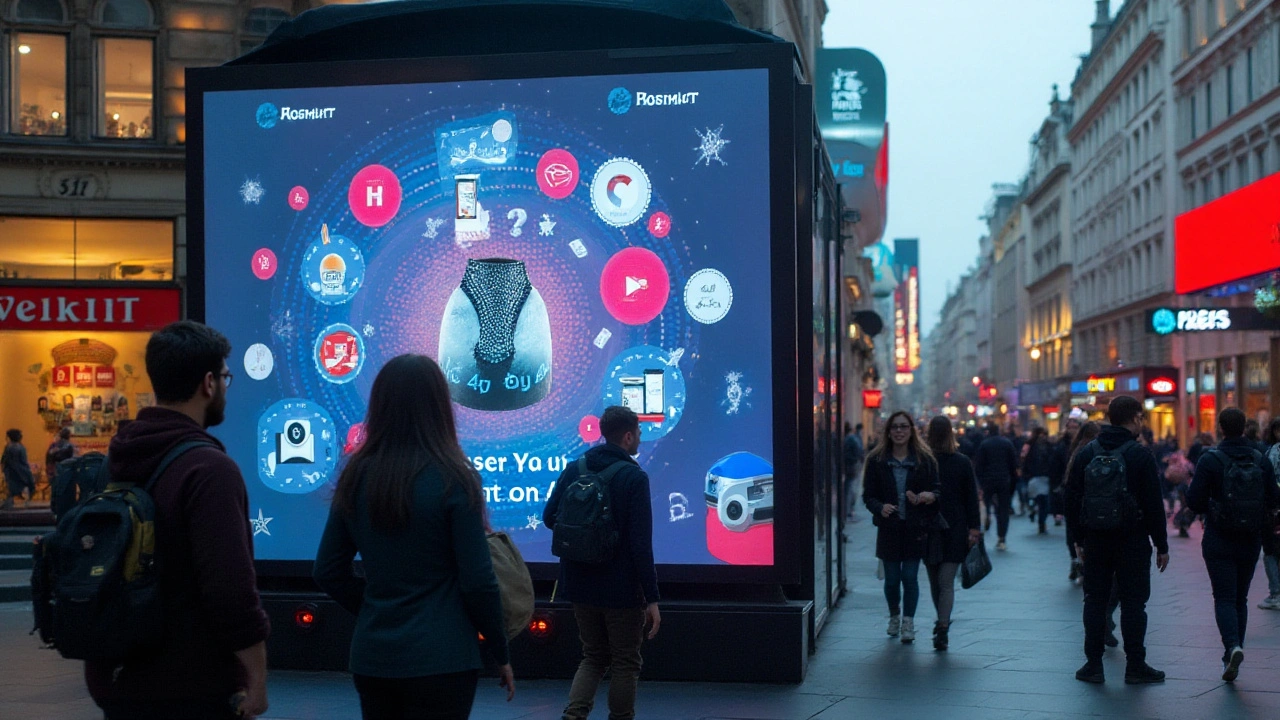In an age where content is king, the tools we use to create that content can make all the difference. Enter ChatGPT, a game-changer in the landscape of writing and content production. It isn't just another tool; it's a digital companion that brings an impressive set of skills to the table, helping transform thoughts into words with remarkable ease. From bloggers to brand managers, everyone benefits from what this AI marvel offers.
It's designed to reduce the workload by whipping up well-crafted sentences and sparking creativity in places where it might falter. As more people venture into content creation, understanding how ChatGPT can amplify their voices becomes crucial. Let's explore what makes ChatGPT tick and its role in shaping the future of content generation across different sectors.
- An Introduction to ChatGPT
- How ChatGPT Enhances Content Creation
- The Versatility of ChatGPT Across Industries
- Challenges and Considerations with AI Tools
- The Future of Content Generation with ChatGPT
An Introduction to ChatGPT
ChatGPT, an innovation from the labs of OpenAI, is transforming the way we approach content generation. At its core, ChatGPT is a language model trained on diverse text data, enabling it to understand and generate human-like text. The journey of ChatGPT started with the idea of creating an AI that can not only respond to queries but engage in a coherent and context-aware conversation. Its foundational design is based on a framework called the transformer, which revolutionized the ability of machines to process languages by paying differential attention to words. This detailed understanding helps the AI craft narratives that resonate with humans, making it an indispensable tool for writers and creators alike.
The versatility of ChatGPT extends beyond just completing sentences. It can analyze the context, adapt the tone, and even mimic different styles of writing, which is something writers often struggle with. Whether you're a student drafting essays, a marketer curating campaign content, or a novelist working on the next bestseller, ChatGPT can be your ally. Interestingly, the model's learning process involves data across myriad topics, trends, and cultures, making it a culturally aware tool. Rather than replacing human input, it augments creativity by inspiring unique ideas and providing fresh perspectives.
Historical Development
The evolution of AI language models has been nothing short of remarkable, and ChatGPT is the pinnacle of this journey as of now. Its predecessors paved the way by proving that AI could achieve impressive feats in language understanding and generation. ChatGPT's rise in popularity is largely due to its accessibility and ability to handle tasks that were previously thought to be exclusively human domains. Back in the day, the idea of AI writing cohesive content seemed far-fetched, but through rigorous development and iterations, OpenAI made it a reality. Skepticism led to cautious optimism once people experienced its capabilities firsthand.
Early versions of ChatGPT were not perfect, but consistent refinement honed its abilities. Now, it's not just a tool but a companion in the creative process. Its training involved processing billions of pieces of text from the internet, allowing it to develop a nuanced understanding of language intricacies. This scale of training is a testament to how far computational technology has advanced, allowing AI like ChatGPT to support content creators worldwide. A notable fact about its development is that each subsequent version is designed to better align with human values and ethical standards, ensuring safe and beneficial AI experiences.
"ChatGPT's achievements underscore the potential for AI to enhance human capabilities, yet they also call for a collective responsibility to use it wisely," said OpenAI CEO Sam Altman.
The introduction of ChatGPT into the mainstream market was a pivotal moment for both technology enthusiasts and content creators. Its capability to serve various sectors, from education and entertainment to business and beyond, is unparalleled. Not only does it save time by handling tedious writing tasks, but it also opens new doors for creative expression. With the power to suggest, edit, and even critique, ChatGPT often feels like having a personal editor at your disposal. For businesses and individuals keen on improving their writing ability and productivity, understanding and utilizing ChatGPT effectively can lead to transformational outcomes in their content endeavors.
How ChatGPT Enhances Content Creation
The digital landscape is constantly buzzing with an ever-growing need for fresh and engaging content. In this vibrant ecosystem, ChatGPT has emerged as a remarkable tool that redefines the content creation process. It acts as more than just a digital assistant; it transforms the way content providers generate material, making it accessible for anyone, whether they are seasoned writers or newcomers testing the waters of creativity. By leveraging complex algorithms, ChatGPT taps into vast databases of information to produce coherent and relevant text.
One of the most significant advantages of using ChatGPT in creating content is its ability to generate ideas and mitigate challenges associated with writer's block. Its intelligent predictions based on previously learned data help provide a continuous stream of concepts and structures that can nurture the initial spark of creativity into a fully developed piece of content. This innovative capability means that ChatGPT can assist in crafting everything from short social media posts to comprehensive, detailed articles, thus catering to various content demands.
Beyond the Basics: Versatility Across Formats
While many tools offer basic grammar checks and vocabulary enhancements, ChatGPT takes it a step further by adjusting the tone, style, and complexity of the text in accordance with user instructions. Whether you're looking to draft a casual blog post or a formal business proposal, the AI adjusts its output to suit the specific need. This flexibility ensures that messages resonate perfectly with their intended audience, maintaining both relevance and engagement.
In an era where time is of the essence, efficiency is another crucial factor where ChatGPT shines. By automating routine tasks such as content idea generation, initial draft creation, and even editing, ChatGPT allows content creators to focus on higher-level tasks like strategic planning and creative storytelling. This assistance is not just a boon for individual writers but also for organizations that are consistently on the lookout for high-quality, cohesive content at scale.
"AI tools like ChatGPT are transforming the realm of content creation by providing unparalleled support in idea generation and execution, allowing writers to push their imaginative boundaries further than ever before." — Content Marketing Institute
Incorporating ChatGPT into the content creation process can also lead to a significant reduction in the time and resources spent on training new writers. As teams grow, the consistency provided by an AI like ChatGPT means that even less experienced writers can produce output that aligns with a brand's voice and quality standards. This technological support creates a stable foundation for content strategies aimed at bolstering brand identity and deepening audience connections.

The Versatility of ChatGPT Across Industries
ChatGPT has become an indispensable tool in numerous industries, bringing a new level of proficiency and creativity to content generation. Its adaptability allows it to cater to a wide range of needs, from technical writing in the technology sector to crafting engaging narratives in the entertainment world. Companies are beginning to appreciate the potential of using ChatGPT to tackle content creation tasks that once required a significant time investment from human writers. By absorbing and understanding large datasets, ChatGPT can tailor its output to specific industry jargon or narrative styles, creating pieces that are not only informative but also contextually relevant. This AI marvel doesn’t just replace human input; it enhances and elevates it.
In the marketing domain, for instance, ChatGPT plays a vital role in creating compelling ad copies and social media content that resonates with the target audience. Its ability to mimic conversational tones makes it ideal for crafting messages that engage and persuade. Retailers use it to write product descriptions that are not only detailed but also optimized for search engines, ensuring increased visibility. It handles customer service interactions with ease, providing prompt and consistent responses that improve user satisfaction. The healthcare industry has also begun leveraging ChatGPT's capabilities to generate patient-friendly educational content without sacrificing accuracy or empathy.
Education is another field where the capabilities of ChatGPT shine brilliantly. Educational institutions and content creators utilize it to draft engaging and comprehensive educational materials, saving educators loads of time on lesson planning. It supports the creation of custom test questions and study guides tailored to various learning levels and subjects, enhancing both teaching and learning experiences. A well-known educational expert once remarked, "AI tools like ChatGPT are pivotal in bridging the gap between technology and education. They provide personalized educational experiences when integrated thoughtfully."
Perhaps one of the most promising applications of ChatGPT is seen in the media and journalism sectors, where time is of the essence. Journalists benefit from its ability to quickly generate first drafts of articles or expand on initial ideas, allowing them to focus on refining and adding depth. Media outlets are beginning to rely on these tools to produce content at scale without compromising quality. In the publishing world, authors are using AI to brainstorm new plot ideas or fill in the gaps during writer's block, enabling a smoother creative process.
While the creative potential of ChatGPT is virtually limitless, it is important to navigate its integration thoughtfully. Compliance with industry-specific standards and ethical considerations should guide its use. For example, using AI to mistakenly perpetuate misinformation or biases could have unintended consequences. Nevertheless, as AI technology continues to evolve, its applications across industries are sure to expand, offering exciting new opportunities for innovation and growth. As organizations and individuals harness the power of AI tools like ChatGPT, they are better equipped to face the future of content generation and all the possibilities it holds.
Challenges and Considerations with AI Tools
Integrating AI technologies like ChatGPT into the landscape of content generation isn't without its challenges and considerations. Firstly, there's the issue of dependency. As fantastic as these tools are, there's a risk that writers might become overly reliant on them, potentially stifling their creative instincts. While ChatGPT can assist with generating content quickly, relying too much on an AI tool might lead to a homogenous voice across different platforms, losing the uniqueness that one's personal touch brings. It's crucial to use the tool as a catalyst for creativity rather than as a crutch. Keeping the balance right between utilizing AI and maintaining personal creativity is an art in itself.
Another key consideration lies in the realm of accuracy and relevance. AI tools, as advanced as they are, sometimes offer information that might not be entirely accurate or up-to-date, given that their

The Future of Content Generation with ChatGPT
As technology continues to advance at a rapid pace, the future of content generation is becoming ever more entwined with tools like ChatGPT. This language model is set to be at the heart of how content will be created, improved, and customized across various industries. Imagine a scenario where content creators can tap into an ever-evolving AI that not only assists but also collaborates in crafting content that is both engaging and relevant. The potential for ChatGPT to understand context, tone, and style preferences is growing exponentially, allowing it to be more than just a tool; it’s becoming a creative partner that can adapt to the unique demands of any project, whether for an intimate blog post or a wide-reaching corporate campaign. Such adaptability ensures that the voice of the content retains authenticity while still benefiting from the efficiencies of AI.
Moreover, as businesses strive to cater to global audiences, the demand for content that resonates with diverse linguistic and cultural backgrounds will increase. Here, ChatGPT can play a crucial role by not only translating words but also translating the essence and intent behind those words. This opens up opportunities for businesses to engage more deeply and genuinely with audiences worldwide, fostering a climate of inclusivity and understanding. Additionally, with the rise of personalized marketing, ChatGPT's ability to learn and predict user preferences could revolutionize how tailored content is generated, ensuring that it meets the specific needs of individual users, thus enhancing user experience substantially.
Looking ahead, there's also the exciting potential for AI tools like ChatGPT to work seamlessly with emerging technologies. For instance, as virtual and augmented reality become more mainstream, the demand for real-time, generative storytelling in these spaces will grow. ChatGPT could be instrumental in creating immersive narratives that adapt to user interactions in a virtual environment, providing a layer of dynamism that traditional content forms cannot match. This fusion of AI with immersive technology has the potential to redefine how users consume information and entertain themselves, making the experience richer and more interactive.
Of course, as with any technology, ethical considerations and challenges will need to be addressed. As ChatGPT becomes more integrated into content generation, questions about authenticity, misinformation, and the potential loss of human jobs will likely arise. Determining how to balance AI-assisted content creation with human oversight and ethical guidelines will be crucial in ensuring that AI tools are used responsibly. Engaging with these challenges head-on, industry leaders and policymakers will need to work collaboratively to set standards and develop practices that prioritize transparency, accuracy, and fairness in AI-driven content.
As the role of AI in content generation continues to evolve, it's interesting to note the words of Sam Altman, CEO of OpenAI, who said,
"The goal is not to replace humans but to augment human creativity and capability through AI."This perspective highlights the path forward, where AI tools like ChatGPT do not sideline human creativity but enhance it, allowing for new and unprecedented possibilities in how content is ideated and produced. As we move into this exciting future, embracing technology, while also valuing the irreplaceable touch of human creativity, will shape a world where content becomes even more engaging, impactful, and meaningful.


I'm a Marketing Expert with over a decade of experience in the industry. I specialise mainly in online marketing and have worked with numerous global brands to elevate their online presence, build their brand image, and increase their sales. My passion lies in creating meaningful and engaging campaigns that truly resonate with audiences. In my spare time, I enjoy sharing my knowledge and experiences through my blog where I primarily write about the latest trends and tricks in online marketing.